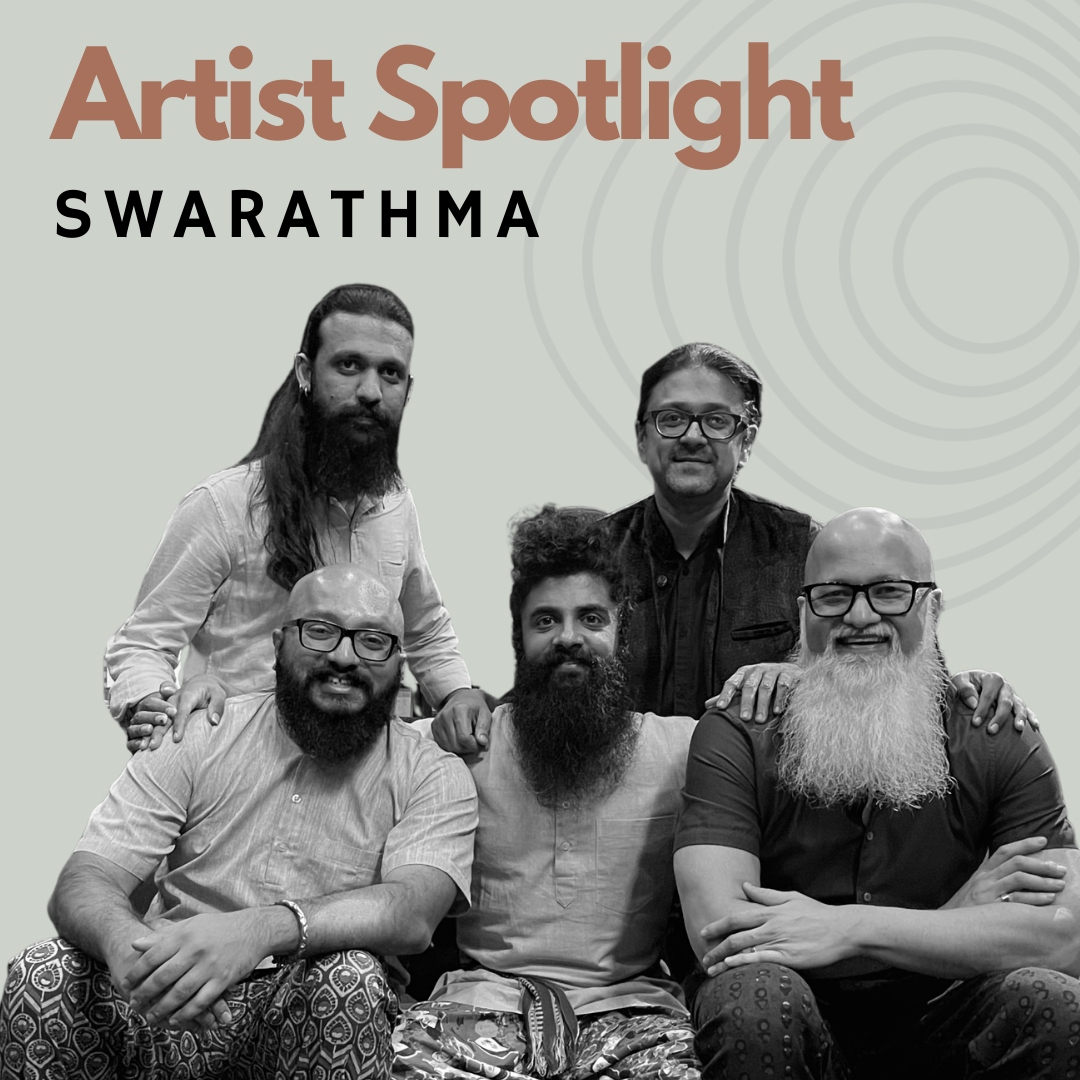
27 Jan Artist Spotlight: Swarathma
The Artist Spotlight series aims to dive deep into the world of contemporary musicians to learn about their stories. Through these conversations, we explore their humanity, personality, musicality, and artistry. Today’s feature brings to you part 1 of our conversation with Jishnu Dasgupta and Varun Murali from one of India’s most loved bands, Swarathma, talking about their sound, music, relationships, and more.
This interview has been edited and condensed for length and clarity.
The folk-rock sound is the signature sound of Swarathma. How did this come about?
Jishnu: Vasu Dixit was one of the founding members of the band, and he was fairly clear that this was going to be folk-rock, folk-fusion, with a blend of Indian and Western influences. A couple of years after they started is when Varun and I joined the band. Each of us have very different influences and it is almost never that we share a playlist. Influences is a very big word to use and of course, you are influenced by what you listen to. But what you want to bring in musically to a room with your bandmates is very different in each band members case, and there is the flexibility and freedom in that space to say that I don’t like your kind of music but I am willing to listen to what you are playing and then try and make that my own. It is only as a result of that intent and attitude that we are able to create a sound that we are able to call the Swarathma sound. Then again, the Swarathma sound by itself is not a static thing. If you listen to what we were coming up with back in 2009, and the stuff we are writing and releasing right now, it has been a huge journey and that reinvention is what keeps it interesting and fresh for us.
In 2018, you released your third album Raah-e-Fakira. This album came six years after your previous album ‘Topiwalleh’- what was the reason for the gap between the two albums? Tell us about the process of creating this album.
 Varun: The reason it took us so long to come up with the third album was because Montry, our then drummer, quit in around 2012 and it took a while for us to deal with that and figure out how to find our balance and equation with a session drummer. We juggled with quite a few session drummers who were great drummers, and great with their musicianship, but having a bandmate is more than just a skillset – it’s the equation that you share. And that took a big hit for us. We didn’t really get time to write new songs or figure out what the direction of the band would be. There really came a point where we decided that we are going to make a rule that until and unless we find a new drummer, we will not play a single show. That was the only forceful way that we drove ourselves to organise an audition to find a new drummer and we found Joel who joined the band. Joel joining really gave us a sense of safety. It allowed us to feel like it is a safe time for us to put out a new album, and make new songs, without worrying about who is playing drums and what would happen. Raah-E-Fakira was in a way more for us than for people. I think we needed the album to feel like we are a band and we are grateful that people ended up liking it.
Varun: The reason it took us so long to come up with the third album was because Montry, our then drummer, quit in around 2012 and it took a while for us to deal with that and figure out how to find our balance and equation with a session drummer. We juggled with quite a few session drummers who were great drummers, and great with their musicianship, but having a bandmate is more than just a skillset – it’s the equation that you share. And that took a big hit for us. We didn’t really get time to write new songs or figure out what the direction of the band would be. There really came a point where we decided that we are going to make a rule that until and unless we find a new drummer, we will not play a single show. That was the only forceful way that we drove ourselves to organise an audition to find a new drummer and we found Joel who joined the band. Joel joining really gave us a sense of safety. It allowed us to feel like it is a safe time for us to put out a new album, and make new songs, without worrying about who is playing drums and what would happen. Raah-E-Fakira was in a way more for us than for people. I think we needed the album to feel like we are a band and we are grateful that people ended up liking it.
 Jishnu: Talking about our drummer leaving brings me to the point we had heard some time ago that “bands don’t tend to break up when they are struggling, bands tend to break up when they are successful.” When we got there we were on top of the world except we were not invested enough in each other to be able to listen to what each other was saying or not saying rather, and that was a part of the reason why our drummer at the time left. What Raah-E-Fakira did for us is that it renewed our faith.
Jishnu: Talking about our drummer leaving brings me to the point we had heard some time ago that “bands don’t tend to break up when they are struggling, bands tend to break up when they are successful.” When we got there we were on top of the world except we were not invested enough in each other to be able to listen to what each other was saying or not saying rather, and that was a part of the reason why our drummer at the time left. What Raah-E-Fakira did for us is that it renewed our faith.
The second and the third album- Topiwalleh, and Raah-E-Fakira, we thought of as a songwriting workshop, which was a week long affair where we shut everything else off, and came in to jam on ideas and finish them. I remember doing the session for the Raah-e-Fakira songs in 2016. We toured the songs for close to two years before releasing the songs. It was good that we did that because by the time we went to the studio, we were a lot more confident with those songs than we would have been otherwise. So Raah-e-Fakira is a lot more inward looking as an album– it was a lot more reflective in the songwriting. It was cathartic in the sense that we were able to feel like “hey, we still got this!”
Hearing you talk about your drummer at the time leaving, it sounds like it was a very emotionally difficult experience. Aside from the obvious logistic challenges of this change, how did you deal with the emotional challenge it posed, and move forward from that experience?
Jishnu: So there’s a Pearl Jam documentary that I watched some time ago, and Eddie Veder talks about their drummer leaving as well. The way he described it is “it’s like getting your heart pulled out of your body” – that’s what a band member leaving, specifically the drummer leaving, is all about. Except, if you had spoken to us in 2012 or 2013, we would have never admitted it to you. We were too gung-ho, too angry, and too proud to admit that we were hurting. And it took us a long time to get over those emotions, and to say to each other that maybe we messed up, maybe we need to ask ourselves how to do better and be better to each other. It took us a long time to figure that out. And that was a big part of growing up with each other. It was the hours that we put in, to get there. It was a deeply emotional experience and it is hard to talk about. Even today, we would rather talk to you about how hard it was to get session drummers than talk about how hard it was to deal with it ourselves. But we did put in that work which is why we are able to express it with you.
Varun: As Jishnu said rightly, whenever these things happen and whenever bands break up, it hits you much later and not immediately, because at that point, whether we want to call it a coping mechanism or what, you somehow end up trying to find the quickest, and most practical way of moving forward. It’s only when you take a break, that a lot of these things start hitting you. Then all these things start seeping into your system and you realise that “yeah I don’t think we dealt with it properly.”
In a musical outfit such as yours with so many different perspectives and personalities coming together to create and perform music, I am sure there are bound to be differences of opinion and perhaps even moments of tension and conflict. How do you navigate those challenging moments, and come together as a band to move through them?
Jishnu: We could have the entire interview on just this one question! It is bound to happen when you are creative people, and people with strong personalities, where you don’t always see eye to eye with each other… In that sense, it is quite similar to a family that oscillates between being dysfunctional and functional. You are related by blood to the people in a family, so there is no getting away from them, and it is almost similar to that in a band like this. You are related to each other by the music you have forged together, so there is no getting away from this family. Yes, there are going to be times where you will feel like throwing in the towel, and calling it quits, and you have those moments in families as well.
I think a large part of it has to do with being able to communicate, or being able to express how you feel in a constructive way. We have learned that the hard way over the years, after having lost a couple of band members, and coming close to losing more than that, and wrecking the relationship we have with each other. It’s important to find that balance between what I personally want, versus what I want for the band, and what someone else wants. It all boils down to whether or not you are able to listen. And it is the same thing that happens in a jam room and on the stage. Your job as a musician is to listen first. Because it is only once you listen, that you are able to play something better. So over the years, we have learned to listen to each other first and foremost, and that is possibly the reason why we are still here.
You have a refreshingly laid back attitude to your approach to the craft of music making in a day and age where pressure, competition, and a volatile music business almost always sees artists burn out, and become demoralised. How have you sustained yourselves, and maintained creative integrity in such an environment for an extended period of time?
Jishnu: I read a quote somewhere that said, “we are all a forest of crooked trees leaning on each other,” and I think that is definitely true in the case of Swarathma as a band. Not only am I propped up by the rest of the band, I am doing that for the rest of the members of the band at the same time. I feel responsible, accountable, and inspired by the fact that I have a bunch of guys who are in it with me. And I think that ability to feel equally a part of an engine that is creating something we all love, is a big part of why we are able to go on. We have seen so many trends come and go, but we would rather do stuff we like. Authenticity is an unwitting part of what we end up doing, and as long as we are enjoying what we are doing, the chances are that people will end up enjoying it as well. It may not be a lot of people, but just enough people to make us feel alright and help us run the engine.
Varun: I feel really fortunate that we somehow formed this band and did what we did before the trend-culture came in the first place. We are so glad that we are not a young band of today trying to fit into Instagram trends, and trying to be a YouTube band– I think that pressure itself kills the band more than anything else. People have told us that we need to do YouTube content, but we are not comedians! So what content do we make for YouTube? It’s ridiculous. I think we need to first understand what we are, who we are, and what we do, decide which of these content platforms fit what we do, and stay in that. Because if you don’t draw that line, you are going to be jumping from one platform to the other, and add too many platforms under your belt.
Stay tuned for part 2 of our conversation with Swarathma, coming soon!
Interviewed and edited by Senjuti Maitra.



No Comments